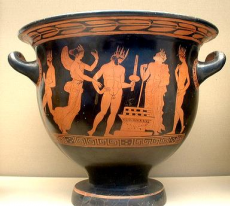
Email: ZYVC057@live.rhul.ac.uk
Total Article : 213
About Me:I'm a graduate student studying International Criminal Law and first started writing for King's News almost 4 years ago! My hobbies include reading, travelling and charity work. I cover many categories but my favourite articles to write are about mysteries of the ancient world, interesting places to visit, the Italian language and animals!

‘Ode on a Grecian Urn’ was written by John Keats in 1919 and is considered to be the third of the five ‘great odes’ of 1819, which are Psyche, Nightingale, Grecian urn, Melancholy and Autumn. John Keats fully embodies the literature and poetry of the Romantic Age and in this particular poem he questions art and beauty itself, leaving us with one of his most famous and most interpreted quotes ‘beauty is truth, truth beauty’. The ambiguity of the poem is not just its last ending verses as scholars and critics continue to question to whom the last verses of the poem – which has five stanzas each 10 lines long – are addressed. Some say it is poet to reader, poet to urn or even figures to urn! So, what is this much discussed emblematic poem about?
The subject of the poem is a lovely Grecian urn which has been passed down for centuries and is now being observed by the speaker. The Grecian urn is perceived as something that lives outside time and space as an infinite beauty. According to the speaker the figures painted on the urn are free from time, yet at the same time they are frozen in time. These figures do not fear death as they will never confront it yet they can never experience true life.
The speaker observes some of the scenes depicted on the urn. In the first stanza there are a group of men that seem to be pursuing a woman and the speakers asks what story is hidden behind the picture, ‘what men or gods are these? What maidens loth?’. In the second and third stanzas the speaker turns his attention to examining the piper who is playing to his beloved underneath the trees. Here, the speaker begins to ask himself more question, questions about the beauty of the lady and how love rests far above all other human passions. In the fourth stanza, the speaker tries to place the images within a time span, imagining that they had an origin (the ‘little town’) and a destination (the ‘green alter’) but once these people leave their town it will be forever deserted. Question after question the speaker tries to understand the urn and what it depicts. If in the first stanza it is impossible to understand the real story of the figures, here it is impossible to understand their journey. It appears that the urn is something very different from what we know, it can be ‘friend to man’ but it will never be immortal. The final stanza contains the beauty-truth equation as the poem ends by stating that ‘Beauty is truth/ truth beauty/ that is all / Ye know on earth, and all ye need to know’ and critics are divided on the meaning of such a statement. What do you think this means and who do you think the speaker is talking to? Why not read the poem which is below and leave us a comment!
Ode on a Grecian Urn
Thou still unravish'd bride of quietness,
Thou foster-child of silence and slow time,
Sylvan historian, who canst thus express
A flowery tale more sweetly than our rhyme:
What leaf-fring'd legend haunts about thy shape
Of deities or mortals, or of both,
In Tempe or the dales of Arcady?
What men or gods are these? What maidens loth?
What mad pursuit? What struggle to escape?
What pipes and timbrels? What wild ecstasy?
Heard melodies are sweet, but those unheard
Are sweeter; therefore, ye soft pipes, play on;
Not to the sensual ear, but, more endear'd,
Pipe to the spirit ditties of no tone:
Fair youth, beneath the trees, thou canst not leave
Thy song, nor ever can those trees be bare;
Bold Lover, never, never canst thou kiss,
Though winning near the goal yet, do not grieve;
She cannot fade, though thou hast not thy bliss,
For ever wilt thou love, and she be fair!
Ah, happy, happy boughs! that cannot shed
Your leaves, nor ever bid the Spring adieu;
And, happy melodist, unwearied,
For ever piping songs for ever new;
More happy love! more happy, happy love!
For ever warm and still to be enjoy'd,
For ever panting, and for ever young;
All breathing human passion far above,
That leaves a heart high-sorrowful and cloy'd,
A burning forehead, and a parching tongue.
Who are these coming to the sacrifice?
To what green altar, O mysterious priest,
Lead'st thou that heifer lowing at the skies,
And all her silken flanks with garlands drest?
What little town by river or sea shore,
Or mountain-built with peaceful citadel,
Is emptied of this folk, this pious morn?
And, little town, thy streets for evermore
Will silent be; and not a soul to tell
Why thou art desolate, can e'er return.
O Attic shape! Fair attitude! with brede
Of marble men and maidens overwrought,
With forest branches and the trodden weed;
Thou, silent form, dost tease us out of thought
As doth eternity: Cold Pastoral!
When old age shall this generation waste,
Thou shalt remain, in midst of other woe
Than ours, a friend to man, to whom thou say'st,
"Beauty is truth, truth beauty,—that is all
Ye know on earth, and all ye need to know."
Image: http://poetry.literaturelearning.org/files/images/Ode_to_a_Grecian_Urn.jpg

0 Comment:
Be the first one to comment on this article.